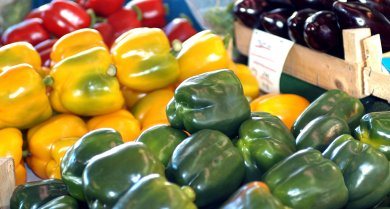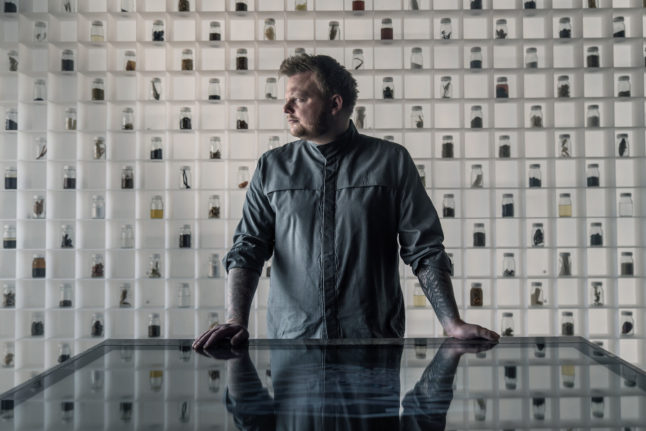Call me frugal, but dropping €3.60 on a jar of honey at a regular supermarket pains me. However, take me to the local farmer’s market and I’ll easily spend even more without qualms on the first jar of golden sweetness I see.
What is it about these outdoor gardens of gastronomic delight that affect me so? What lures me down the street each week to my local market, wielding a wallet, freshly replenished by the closest Sparkasse ATM?
No, I don’t have a secret crush on the sock man, though his selection is impressive. It’s a number of things – the way the Turkish lady always throws in a free dip along with my hummus, the fact the greengrocer gave me two extra bananas last Saturday, and how the apple man helps me practice my German. The personal nature of the market – as much as what’s on offer – keeps me going back week after week.
Fortunately, Germany is home to hundreds of fantastic outdoor markets for me to explore. One of the largest and most famous is the Viktualienmarkt in Munich. Blessed with a 16-degree day during a recent visit to the Bavarian capital, I strolled over to the south side of Munich’s historic centre, where the market sets up every day but Sunday, to do some investigating.
In 1807, when the original market on Marienplatz, Munich’s central square, became too small, the Viktualienmarkt moved to its present location. Today, over one hundred stalls fill the space, and many of the vendors are housed in actual shops with walls, windows, and doors. Collectively, they’re proof positive that Bavarians don’t only eat Weißwurst and Leberkäs every single day.
The Viktualienmarkt has a reputation for being a gourmand’s type of place – brimming with fabulous international specialties. On first glance, the 22,000 square foot market resembles an extra-large version of your usual farmer’s market, full of everything from potatoes to Parmesan. But with a discerning eye (and nose) one can sniff out many a culinary treasure. I decided to take a passive approach, left the cabbage haggling to the locals, and stopped in at a few of the quieter stalls for some special things that I could bring home in my carry-on bag on my flight back to Berlin.
But first I had to make my way past an overwhelming barrage of fresh flowers at the entrance to the market. It suddenly seemed as if spring had come eight weeks early. Beautiful blossoms crowded their tiny pots, creating a cheerful and fragrant atmosphere. I didn’t allow myself to be distracted by such floral beauty though, and I quickly set off for my intended target in Munich – the food.
I made my way to Hammer Feinkost which specializes in fine Italian products. Pecorinos and provolones lovingly laid out in the cheese case certainly were enticing, but it was the handmade pasta that had me smitten. “The best pasta from Italy” read a handwritten note taped to a crate filled with boxes of La Campofilone linguine. Apparently Senora Albanesi came up with the recipe in 1912, and her daughter continues kneading, rolling, and slicing the dough in the tiny hill town near the Adriatic coast that gives the company its name. Reluctantly I put the box back, deeming it too big for my bag, and set off in search of something smaller.
Just down the aisle, the Lupper stall is chockfull of French cheeses, Spanish hams, and Portuguese wines among other tasty goods. While Ursula runs the cheese and wine stand, Thomas divvies out an assortment of antipasti, meats, and spices next door. My eye ran along the attractive rack of curries, oreganos, parsleys, peppers, and other tantalizing herbs and spices, before stopping on the fresh cinnamon. I snatched up a 50-gram bag baring the lovely Lupper label, paid the €1.80, and continued on my merry culinary quest.
One of these more established-looking structures inside the market is the Honighaus, where upon entering I discovered the finest variety of honey I had ever seen. Though there were certainly no bargains to be had there, the dozens of different brands that filled the shelves simply mesmerized me. Drawn to the Hamburg-based L.W.C. Michelsen’s elegant label, tiny size, and dizzying array of flavours (avocado, eucalyptus, and lime to name a few), I decided the lavender honey would go best with my favourite morning beverage, Earl Grey tea.
As I left the shop and stepped out into the unusually strong midday sun, I noticed the Biergarten brimming with happy Bavarian boozers basking in the pre-springtime warmth. Though the market’s name Viktualien is derived from the Latin word that gave English the term victuals, here it was abundantly clear that beer and not food was on everyone’s minds. Not wishing to spend my money on only overpriced honey while in Munich, I quickly sat down, ordered myself a brew and enjoyed the southern sunshine.



 Please whitelist us to continue reading.
Please whitelist us to continue reading.